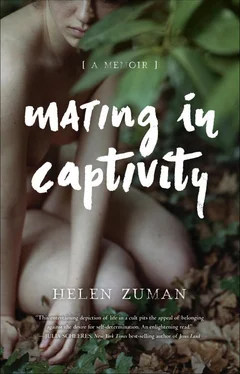“A lot of us up the hill are feeling like it was a bad idea to have Helen come back. We gave it a shot, and it didn’t work out. No hard feelings, but we think she should go. She’s not cut out to be a Zendik.”
Shure chimed in from the couch behind me. “I get this competitive vibe from her about the new kitchen. She was supposed to help set it up, then she left. Now she won’t give anyone else credit. I haven’t heard her say one nice thing about it.”
“Yeah,” said Karma. “I’m not even sure why she made the trip. I didn’t feel good about seeing her again. Nobody did. That’s why I couldn’t find her a ride from Spindale. Psychically we all knew what she’d be like. I’m all for second chances and people changing—but Helen is a long shot.”
Prophet slapped a mosquito against his arm. Zar cleared his throat and turned to Lysis. “Remember the old days, Lys? When Wulf used to tell people, ‘You have five minutes to decide’? You got thrown up against it, you had to spit it out. I say Helen gets five minutes.”
Lysis nodded. So did Prophet. Then he looked my way, for the first time that afternoon. “Helen, where are you at?”
Fear of exile surged from gut to throat to mouth, crashed against the remembered trespass of Alvin’s lizard tongue. If I left again, whose prey would I become?
“I want to be here,” I quavered. Tears mustered in my ducts. Surely they would back me up.
“I don’t believe her,” said Karma, cheeks scrunched in scorn. “She cries all the time. It means nothing.”
Prophet shifted in his chair. Squeezed the armrest. “How about this. She has half an hour to go off by herself and decide. One half hour. That’s it.”
With that he shed the role of surrogate executioner—and reprieved me, briefly, from scrutiny.
He rose to leave. The crowd rose with him. No one checked a clock or set a timer. Who would track my half hour?
I bolted out the back door and down the path through the woods to the outhouse. I fastened the latch, then closed the toilet lid and sank onto it, mouth-breathing to shut out the sour scent of shit rising from the ten-foot chute.
What should I do? If I were doubt-free, this ultimatum would not have come for me. Yet leaving again, in my story, meant dropping to an end as dead and foul as the floor of the shithole.
I couldn’t force out doubt in half an hour. But I could feign certainty as I beat a path back to the Farm’s heart.
After what seemed like thirty minutes, I made for the dance room, where Swan was leading a class packed with my peers. Neither Arol nor Zar nor Prophet would be there. If I could convince Swan, I was in.
I crept up the steps and peeked through the fanlight in the door. Swan was leading a few rows of dancers in a sequence of kicks. She glistened with sweat; they pulsed red with the fight to keep up.
I had to sync with that beat.
I turned the knob and slipped inside, heart pounding twice as fast as Swan’s count. She paused. The door clicked shut behind me.
“I decided I want to stay.”
Her eyes narrowed. “Are you sure?”
“Yes. I’m sure.”
She waved me forward and resumed her count. Rave and Karma stepped apart to let me in. I seized the beat and kicked.
Zar kicked off the first sex meeting of the fall with a recap of the pattern set during my absence: at each of the past few meetings, one or two people had either volunteered or been chosen to have their sexuality critiqued. “Who wants input this time?” he asked.
I seized the chance.
In the month since my return, I’d failed to weave myself back into the dating scene. Most of the men seemed wary of my otherness—fearful it was contagious. Kro had said no when I’d hit him up for a walk the previous week. I expected the input to sting; I hoped it would help web me in.
I’d gone on at least a walk with most of the men in the circle on the floor of the Mobile (now the music room, where Zar reigned as recording engineer). But I’d managed multiple dates with only a few and tried a relationship only with Kro. Amory had left the Farm soon after I had. Owen, another ex-boyfriend, had left in spring 2001. Of all the men present, Kro knew me best.
He reported, to nods from other men, that I liked kissing and making out but was cock-shy, and stiff during sex—a frustrating lay, in short. Of course his judgment stung. But what crushed me was his flat tone, his blank gaze—he could have been reviewing a toothbrush.
Had I been wrong to take Alvin’s lunge as a push toward Kro? Or had I just moved too soon? Maybe, before he would touch me, he’d need proof I belonged.
Arol’s sixty-fourth birthday—October 14, 2002—brought news of a siege I could use.
At her party, after dinner in the living room, I was tired but excited. I’d chosen to stay up till dawn finishing my gift: a purple, gold, and cerulean circle-Z embroidered on a square of midnight velvet—and it seemed I’d made the right call. As she opened her presents, she gibed those who’d pledged items to be delivered later: “I want the thing in my hands now , goddammit!” She was only half-joking.
When she raised my work to the light and exclaimed, “How pretty!” I flushed with pleasure, glad I’d grabbed this chance to stitch myself into her favor—even as I puzzled over a new chord in her manner: tinny gaiety, shrill with joyless laughter.
After cake, she stilled the room. “I have something to tell you guys,” she said. “I went to the doctor this afternoon. They did some tests; I got the results…” She paused. We pulsed. A harsh sparkle lit her eyes.
“I have cancer,” she said. “It started in my ovaries and spread to this whole area.” She circled her abdomen with a half-curled hand. “I’ll have to have a hysterectomy.”
Once, selling to a graying, middle-aged man under a Savannah overpass, I’d been asked if the law of cause and effect applied to people with cancer. Did they lure it into their bodies, to speed release from lives they couldn’t bear? “Yes,” I said, ignoring his tight lips, his fierce stare.
The man’s jaw clenched. His eyes burned with hurt and hate. “My wife has cancer,” he said.
As the shock wave of Arol’s revelation broke over me, I flashed on this exchange, then blacked it out. How dare I link her sickness to a Deathculture incident or invoke a pattern used to probe the average pain? Surely her circumstances were singular, and beyond my ken.
A year later, Arol would announce the psychic source of her cancer: overdevotion to the revolution. Her fervor for Earth saving had spurred her to work too hard.
The room whirred with incredulous murmurs. Could it be true that Arol was mortal? She’d seemed superhuman—hot to forge ahead no matter what, suffering others but not needing us.
Two weeks later, at an evening meeting in the Addition kitchen, Arol edged closer than she ever had, in my presence, to declaring her dependence.
She sat with her back against the table, as if to brace herself for the press of the rest of us. Some stood, hugging walls and counters. I squeezed onto the floor a few feet in front of her.
“I’m going to Mexico for a month,” she said. “For treatment after my operation.” Defiance rumbled underneath her words.
With Karma’s help, Arol had found a healing center, just south of the California border, that took a holistic approach to expelling cancer. The center’s founder and chief physician, Arol said, had been run out of the US by drug companies guarding their profits.
Challenge flared in her gaze. “It’s going to cost twenty-five thousand dollars,” she said.
The room throbbed with breath and heartbeat. No one spoke.
Medicare must have been slated to pay for Arol’s hysterectomy at a Charlotte hospital; the cost of the surgery never came up. But Medicare didn’t cover visits to renegade doctors in Mexico. And $25,000 was a big chunk—roughly what we’d make in five to eight selling weekends. To save herself, Arol needed our help.
Читать дальше











